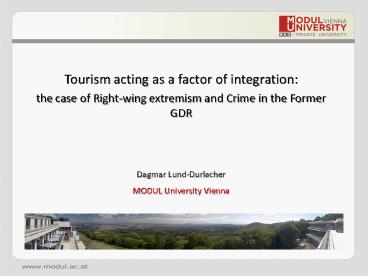Geospatial Web - PowerPoint PPT Presentation
1 / 12
Title:
Geospatial Web
Description:
Tourism acting as a factor of integration: the case of Right-wing extremism and Crime in the Former GDR Dagmar Lund-Durlacher MODUL University Vienna – PowerPoint PPT presentation
Number of Views:8
Avg rating:3.0/5.0
Title: Geospatial Web
1
Tourism acting as a factor of integration the
case of Right-wing extremism and Crime in the
Former GDR Dagmar Lund-Durlacher MODUL
University Vienna
2
Background
- Reports over brutal racist attacks in the
- former GDR in German and international
- media.
- Tourism authorities complain that these
- attacks harm their tourism figures, 2007 survey
- Tourism figures in Saxony-Anhalt could have been
11 higher without neo-Nazi association. - Mecklenburg-Western Pomerania in 2006, an
estimated 400.000 people changed their minds
about visiting the area, costs up to
200.000 million Euros (IPSOS 2007). - Reported racist attacks combined with the
- existence of a neo-Nazi movement affect
- travellers decisions on traveling to the
- former GDR.
3
Research Questions
- Do reported racist attacks and the existence of
neo-Nazi movements in the former GDR states
affect travelers decisions on traveling there? - What reactions and strategies do travelers show
and develop? - What measures can be applied to combat the
negative effects and counteract negative tourist
developments? - Is tourism able to contribute to reducing
right-wing extremist attidues?
4
Subject of Study
- Right-wing extremist ideology has its roots in
nationalism and racism. It is governed by the
idea that ethnic affiliation to a nation or race
is of the utmost importance for an individual.
All other interests and values, including civil
and human rights, are subordinate to it. - Right-wing extremism in Germany
- No homogenous ideology, but ethnic affiliation
and xenophobia are common charachteristics - occurs in various forms
- a violence-prone juvenile sub-culture ,
- right-wing extremist skinheads,
- neo-Nazi groupings propagating a totalitarian
state, - parties striving to gain political influence.
Source www.verfassungsschutz.de
5
Research Method
- Focus group discussions in Berlin
- 3 groups consisting of Berlin citizens with
similar backgrounds and similar distribution of
demographic characteristics (age, gender,
familial status)
Focus Group Family with children Couple without children Single
Immigrants 3 2 2
East-Berliner 2 1 3
West-Berliner 2 3 2
Total 7 6 7
6
Topics of the Explorative Study
- Travel behavior to the former GDR states.
- Personal perception and sensitivity towards
right-wing extremism. - Personal experiences with right-wing extremism
during trips to the former GDR states. - Changes in travel behavior and strategies to
avoid conflicts with neo-Nazi movement.
7
Personal perception and sensitivity towards
right-wing extremism
- Sensitivity depends on the social background
- Right-wing extremism is...
- known through reports in the media
- seen as a juvenile phenomen
- seen as a form of general crime
- not only a German phenomenon, but strongly
stirred up through the media - stronger in the former GDR states than in the
old states, because - Higher unemployment rate and therefore higher
frustration level in former GDR - Disorientation of juveniles
- Juveniles jealousy of tourists
- Adults are not used to the mass of foreign
tourists and therefore avoid contact - Xenophobic attitudes of parents are transefrred
to juveniles - Less problematic in highly developed tourist
destinations
8
Change in Travel behavior
- Due to personal experience with xenophobic
incident - No return to the place where the incident
happened. - Information to friends, family and colleagues and
the media. - Due to media reports on racist attacks
- Foreign immigrants react more sensitively.
- Berlin-born citizens do not feel like a target
group for racist attacks and see themselves as
being well-informed and able to estimate the
danger. - All would continue to make further trips to the
eastern federal states. - Boycott of the destination only for a short time
after the incident. - Long-term boycott if there are repeated racist
attacks and an acceptance of right-wing extremist
attidudes by local politicians and/or residents.
9
Strategies to avoid racist attacks
- Not to be recognized as a foreigner and not to
attract attention. - To travel in a group, preferably together with
Germans. - To escape from dangerous situations.
10
Measures to combat the negative effects
- Socio-political measures
- Job creation in the former GDR states.
- Affirmative action for the youth.
- Promotion of a positive tourism attitude amongst
population. - Improvement of law regulations to judge
right-wing extremists easier. - Security measures
- Higher presence of police.
- Employment of tourist companions.
- Ban and exclusion of neo-Nazis from certain
areas. - Communication measures
- Informing and educating tourists about the
right-wing extremism scene. - Local politicians, opinion makers and population
distance themselves from right-wing extremism
ideas. - Creation of a positive attitude among the local
population towards tourists.
11
Summary
- Frequent, brutal, racist attacks in a tourist
destination have a negative impact on the tourist
arrivals in the destination. - The open and visible presence of right-wing
extremist groups leads to a decrease in travel to
the destination. - The acceptance of right-wing extremism attitudes
by local politicians, opinion makers and local
population leads to a decrease in travel to the
destination. - Foreigners and foreign tourists in highly
developed tourist destinations are treated more
positively than in weakly developed tourist
regions.
12
Conclusions
- Tourism plays an important role in
- the reduction of prejudices towards foreigners
and the reduction of right-wing extremist
attitudes, - the buildup of dialogues between the local
population and (foreign) tourists, as well as - the integration of right-extremism minded fringe
groups.
Thank you!

